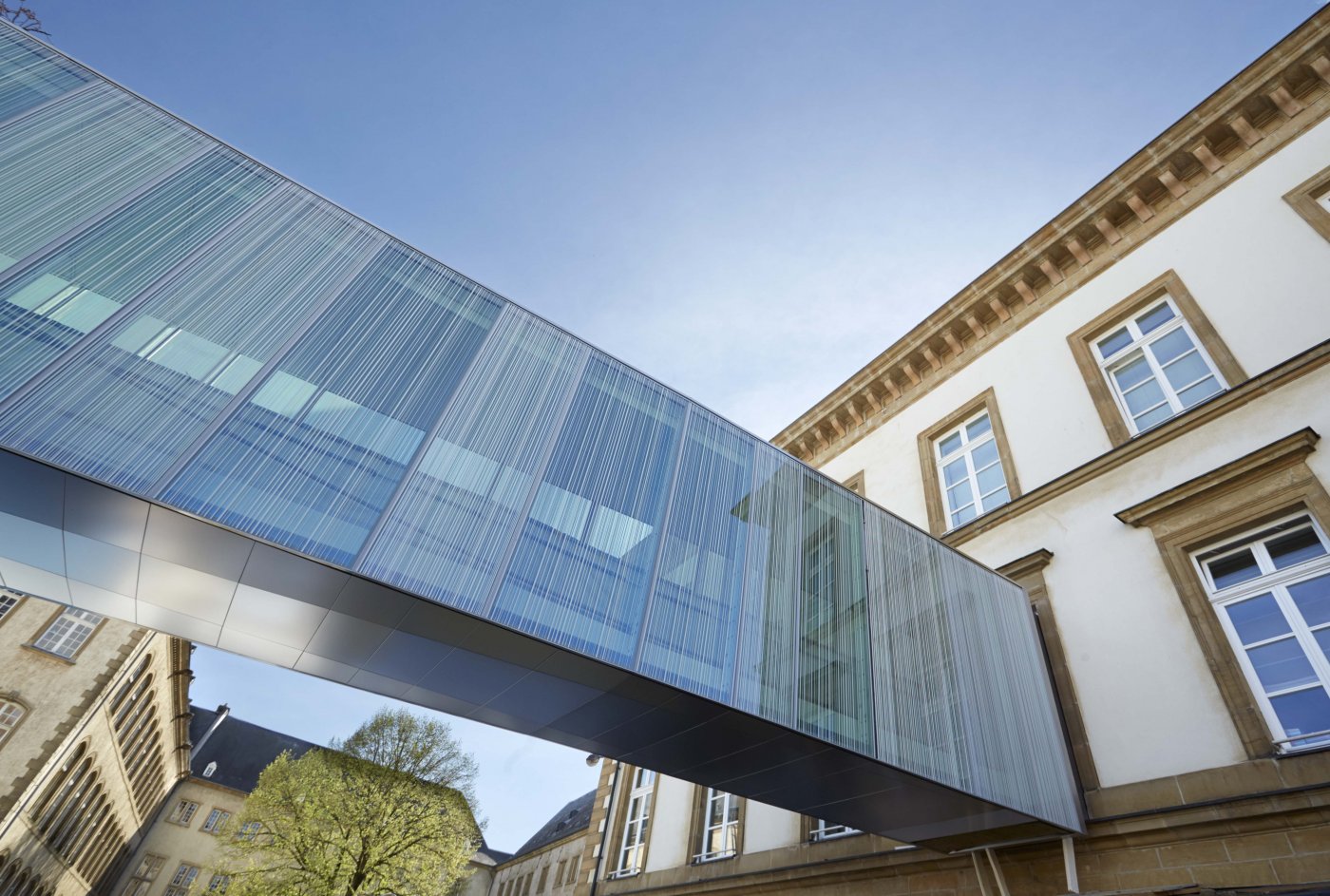Summary record
Video
Vulnerable people and remote working
Question posed by Roy Reding
A vulnerable person, as understood in relation to the stipulations surrounding the COVID-19 pandemic, has informed me that the City of Luxembourg administration has refused to allow her husband to work from home. Both work in education. A person living with a vulnerable person, the council will recall, was allowed to apply for remote working so as not to put them at greater risk of infection. The household in question received a letter from the head of the City's Département Prévention-Santé-Diversité (Prevention, Health & Diversity Department), denying the husband's remote working application.
- Why is the municipal administration flouting the rules on the protection of vulnerable people?
- Why was the decision in question taken by a municipal employee with no medical qualifications, and not the Service Enseignement (Education Department) or the school doctor?
- Is the employee in question authorised to sign on behalf of the mayor?
- What is the situation in terms of liability for failure, on the part of the municipal administration, to protect a vulnerable person?
Response provided by Colette Mart and Lydie Polfer
The woman in question is a primary school teacher, and therefore a Government employee, whereas her husband works in a foyer scolaire run by the City of Luxembourg. The municipal administration has produced guidelines for members of staff who live with a vulnerable person. What is important is to strike the right balance between catering to residents' needs and working within the constraints imposed by the fight against the virus. Many municipal employees have been furloughed, or have worked from home during the lockdown.
For foyer scolaire staff, it is generally not possible to work from home. The employee in question was furloughed until 25 May, the date on which primary schools and foyers scolaires reopened.
The decisions relating to such cases are made, not by the schools physician, who was a member of the crisis response unit, but by the Direction Ressources humaines (DRH – Human Resources Directorate) in accordance with government guidelines and procedures set by the college of aldermen. The Département Prévention-Santé-Diversité at the DRH is in contact with the occupational health practitioner, who is qualified to make such decisions.
The college of aldermen decided that the persons in question should be temporarily excused from working directly with children, but should nevertheless be present in the foyer scolaire. For example, they prepared materials, disinfected toys and supervised the children in the playground. The persons in question received guidance from their doctor on the hygiene practices to be observed.
This is not the only such case. The municipal administration has endeavoured to deal with all similar cases fairly, and with the requisite sensitivity.
Development of Place de la Constitution
Question posed by Claudine Konsbruck
The municipal administration recently announced that the City of Luxembourg and the Government intended to redevelop and enhance Place de la Constitution and the surrounding area.
These are laudable intentions since this is a remarkably unique space in the heart of the city that deserves so much more than to be used as a car park.
The authorities want to convert it into an attractive, pedestrianised, multi-purpose space. In particular, there are plans to build a tourist information office, a ticket sales booth, a food and drink stand, a new lift to the Casemates, and more.
Place de la Constitution is also used as a stopping point for numerous tour buses and other vehicles, which drop off and pick up hundreds of visitors there each day. The coming-and-going of these buses often causes traffic congestion in the city centre.
- What is the projected schedule for the development of Place de la Constitution?
- What are the exact details of the development?
- What solutions are planned for the tour buses, the hop-on/hop-off buses and the small tourist train which currently stop here?
Response provided by Lydie Polfer
Place de la Constitution is Government property, and a working group has been set up including representatives of the Government and the City of Luxembourg. The launch of the competition for ideas, planned for March 2020, has had to be postponed to autumn 2020 due to the COVID-19 crisis.
The stops for tour buses have already been moved to Boulevard de la Pétrusse, and buses no longer have access to Place de la Constitution. The stop for the tourist train has been moved to Montée de Clausen. In addition, the taxi ranks will be moved from Rue Notre-Dame to Rue Willy Goergen and Place de la Constitution (in advance of the planned redevelopment). This will allow cafés and restaurants to put their terraces on Rue Notre-Dame. Place de la Constitution will be closed to vehicular traffic once the extension to the Knuedler car park is complete.
The redevelopment of the square will notably include the entrance to the Casemates and the installation of a lift to the floor of the Pétrusse Valley (operating either along the cliff face or inside a shaft).
Social housing and the Service Logement
Question posed by Guy Foetz
In reference to my question on 7 October about social housing and the Service Logement (Housing Department), I note that a number of elements of that question had not yet received a satisfactory response as at 16 December. Given the urgency of the housing situation in Luxembourg City, and of the general housing shortage nationwide, I reiterate my questions on these matters:
- What is the average waiting time for social housing in Luxembourg City?
- Besides cooperation with other organisations and referral to the Office social (Social Welfare Office), what support does the City provide to those seeking social housing until their request can be met?
- Does the City of Luxembourg have an inventory of vacant properties within its territory?
Response provided by Maurice Bauer
Currently, there are some 550 applications pending. The criteria include family circumstances and the urgency of the application. However, it is not easy to determine the average waiting time, but applicants whose case is not urgent may be waiting for between three and four years.
The City is investing heavily in building affordable housing and social housing, and is also working closely with other parties.
Unfortunately, the number of applications is likely to increase even further. For that reason, the City of Luxembourg is directing applicants notably to the Housing Fund (Fonds pour le développement du logement et de l’habitat), Société nationale des habitations à bon marché (SNHBM), the Social Housing Agency (Agence immobilière sociale – AIS) and Wunnéngshëllef, and also contacts the Office social where appropriate.
Finally, the City does not have an inventory of vacant properties, because such an inventory would contravene data-protection regulations.
Tramsschapp underground car park
Question posed by Carlo Back
As part of the recent discussion about the Limpertsberg cycle path and the lack of car parking spaces in the district, I would like to ask the college of aldermen about the car park underneath the former "Tramsschapp" in Limpertsberg. This car park was built 20 years ago, notably to provide teachers in schools in Limpertsberg with a place to park. At present, this car park is not included in the city's parking guidance system.
With this in mind, I would like to ask the college of aldermen the following questions:
- What is the total number of spaces available in the "Aalen Tramsschap" car park in Limpertsberg?
- How many of these spaces have been purchased by private individuals living in the district?
- How many spaces are rented to private individuals or to teachers in Limpertsberg's schools?
- What is the occupancy rate of this short-stay car park?
- What are the current purchase and rental prices?
Response provided by Patrick Goldschmidt
The Tramsschapp car park has 302 parking spaces, 8 of which are for persons with reduced mobility. The City offers people living within 300 metres of the car park four long-term rental options (5, 10, 20 or 30 years).
- At present, there are 10 people who have taken up that offer.
- 15 spaces are rented to private individuals living within 300 metres (7 yearly contracts, 1 six-monthly contract and 7 monthly contracts).
- 23 spaces are rented to teachers (on quarterly contracts, valid from Monday to Friday, 7:00–19:00).
The average occupancy rate is:
- 16.6%, or 42 cars, Monday to Sunday (over a 24-hour period).
- 9.8%, or 25 cars, between 8:00 and 17:00.
- 47.2%, or 120 cars, between 17:00 and 21:00.
- Peak occupancy is between 19:00 and 20:00, at 64.5% (or 164 cars).
Thus, at least 35.5% of spaces in the Tramsschapp car park would still be available for anyone wishing to rent a space there. This is an interesting option for local residents who do not have a private garage.
Long-term rental rates range from €8,379 for 5 years to €50,278 for 30 years. An annual rental costs €1,933; a six-month rental is €1,017.40; and a monthly rental is €172.96. A quarterly rental for teachers costs €228.91, which works out to €76.90 a month.
Twice-weekly market at Place Guillaume II
Question posed by Cathy Fayot
The twice-weekly market at Knuedler is still in winter mode, meaning that there is a reduced number of stalls selling their products.
However, over the past few years, we have noticed that an increasing number of stallholders do not return in the spring, and that the market is slowly but surely being deserted, due to falling customer numbers and perhaps other reasons.
Lëtzebuerger Maartverband ASBL made this same observation at its general meeting on Sunday 8 March 2020.
This observation leads me to ask the following questions to the mayor:
- Does the City wish to continue holding a twice-weekly market in the city centre and in the Gare district? Perhaps in other districts as well?
- How does the City plan to revitalise the market and attract customers?
- Are the opening times still suitable for customers' needs? (Only a Saturday market open from early morning until 15:00 or 16:00?)
- Does the City intend to take an active approach to attract new merchants with new products and thus diversify the products on offer?
- What is the policy regarding the placement of the different stalls at the market?
- How is parking for merchants' trucks and vans organised to facilitate the restocking of stalls?
- What are the stall rates? (Standgeld)
Over the course of the year, many other events take place at Knuedler, and major works are due to start in September 2020 to revitalise the public square.
- Has an alternative site been found which can accommodate the Wednesday and Saturday markets while these works are ongoing, and when other events are on (e.g. the Mäertchen, the Christmas market)?
- If so, which site? Does it offer easy access for merchants and their customers?
Response provided by Patrick Goldschmidt and Lydie Polfer
This question was originally asked prior to the lockdown to stem the spread of COVID-19. Since then, the situation has changed. There are two active markets: one at Place Guillaume II, and the other at Place Léon XIII in Bonnevoie. No markets are currently being held at Place de Paris, owing to a lengthy construction project.
The college of aldermen hopes to make the existing markets the best they can be before attempting to organise others, bearing in mind that a pilot project to run a market in Kirchberg had to be scrapped because too few customers turned up. In addition, the City encourages the attendance of food trucks, which will draw customers to the markets.
It will work in conjunction with the new head of Lëtzebuerger Maartverband ASBL to assess whether adaptations can be made to opening hours, e.g. opening on Wednesday evenings.
Forms are available on the City of Luxembourg's website for merchants wishing to take part in the market.
So far this year, six merchants have contacted the municipal administration about this matter.
In addition, the City always assesses whether the newly proposed stalls would fit in with what is already in place. The college of aldermen has asked the relevant municipal department to actively seek out stalls that would bring added value to the markets.
One large stall that has been a cornerstone of the market for many years has not come back since the start of lockdown, and the owner does not intend to return this year. The spot in question, therefore, is currently available for another merchant to occupy.
Stalls are organised on the basis of practical considerations (spatial orientation of stands, access routes, accessibility for vans and trucks, etc.). At present, the City is trying to limit the number of vehicles at Place Guillaume II as much as possible, in view of the ongoing works. With all of this in mind, it could be feasible to use the schoolyard in the old Athénée high school as a temporary car park for certain vehicles.
Rates are set out in the tax regulations (Règlement-Taxe). The rate is highly competitive (around €500 per year for a 10-metre-long stall). There are currently no plans to increase this rate.
Finally, there were a lot of market-goers during the lockdown, so the college of aldermen is happy that it decided not to close the market during that period.
With many new customers, the market is stronger than ever in the wake of the crisis. The municipal administration hopes that this positive impact will last.












